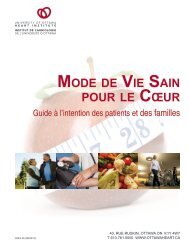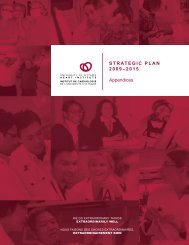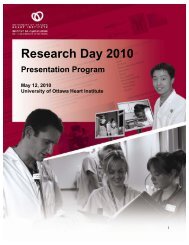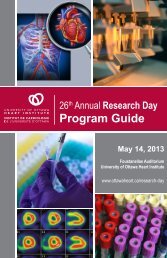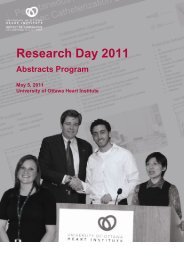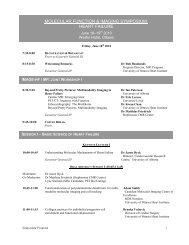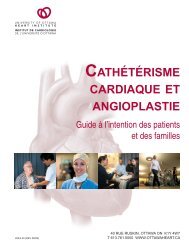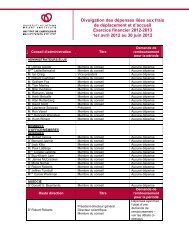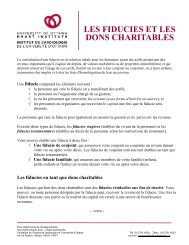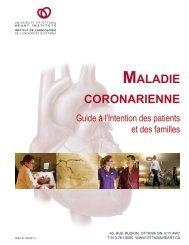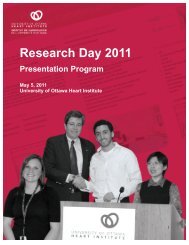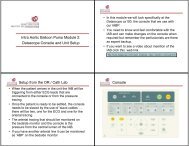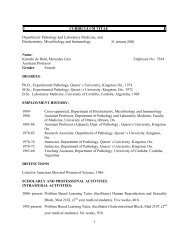University of Ottawa Heart Institute's Smoking Cessation Network ...
University of Ottawa Heart Institute's Smoking Cessation Network ...
University of Ottawa Heart Institute's Smoking Cessation Network ...
Create successful ePaper yourself
Turn your PDF publications into a flip-book with our unique Google optimized e-Paper software.
<strong>University</strong> <strong>of</strong> <strong>Ottawa</strong> <strong>Heart</strong> Institute’s <strong>Smoking</strong> <strong>Cessation</strong><br />
<strong>Network</strong> Grows to 50 Hospitals Across Canada<br />
<strong>Heart</strong> Institute Model, with 50% Quit Rate, Is Focus <strong>of</strong> First Clinical Conference<br />
OTTAWA – Jan 21, 2009 – The <strong>University</strong> <strong>of</strong> <strong>Ottawa</strong> <strong>Heart</strong> Institute’s (UOHI) smoking<br />
cessation network has grown to 50 Canadian hospitals, which have been mentored by<br />
UOHI since the program began in 2004. To date, some 6,000 Canadians are smokefree<br />
after being identified and treated through UOHI’s <strong>Ottawa</strong> Model for <strong>Smoking</strong><br />
<strong>Cessation</strong>.<br />
UOHI’s model, considered the most advanced approach to identify and treat tobacco<br />
addiction, results in close to 50% <strong>of</strong> participants remaining smoke-free at 12 months.<br />
The model is so successful that UOHI will host The First <strong>Ottawa</strong> Conference on<br />
<strong>Smoking</strong> <strong>Cessation</strong> January 23-24 with top tobacco addiction experts across North<br />
America advising physicians and other health pr<strong>of</strong>essionals on how to best help their<br />
patients.<br />
“Tobacco addiction is the most fundamental preventive health issue in Canada.<br />
Smokers understand why they shouldn’t smoke and very much welcome assistance in<br />
quitting smoking. Through our programs, we are developing a group <strong>of</strong> clinical leaders<br />
who will introduce a very successful smoking cessation program – the <strong>Ottawa</strong> Model –<br />
to hospitals across Canada. The conference is another demonstration <strong>of</strong> the <strong>Heart</strong><br />
Institute’s leadership in preventive medicine,” said Dr. Andrew Pipe, Head <strong>of</strong> the Minto<br />
Prevention and Rehabilitation Centre, UOHI.<br />
Said Robert Reid, Associate Director, Minto Prevention and Rehabilitation Centre,<br />
UOHI: “Until now, there have been very few conferences in Canada discussing clinical<br />
approaches to smoking cessation. This enables us to recast and solidify the role <strong>of</strong><br />
hospitals in preventive health care. The <strong>Heart</strong> Institute is playing a pivotal role in<br />
educating hospitals and clinicians across the country on how to consider tobacco use<br />
as an addiction, to help identify smokers, and to provide effective, long-term<br />
treatments for their patients.”<br />
About 20% <strong>of</strong> patients admitted to hospital are smokers and admission to hospital can<br />
provide a significant opportunity to quit. UOHI’s <strong>Ottawa</strong> Model is a hospital-based<br />
program helping patients quit with an exceptional combination <strong>of</strong> personal counselling,<br />
pharmacological treatment, information, follow-up and feedback. The model is also<br />
considered a major tool in managing chronic disease.<br />
The First <strong>Ottawa</strong> Conference will feature:<br />
• Dr. Andrew Pipe, one <strong>of</strong> Canada’s leading researchers on approaches to the<br />
prevention <strong>of</strong> cardiovascular disease.
• Dr. John Hughes, a psychiatrist and Director <strong>of</strong> the Human Behavior<br />
Pharmacology Laboratory at the <strong>University</strong> <strong>of</strong> Vermont in Burlington, a leading<br />
researcher on issues relating to mental health and tobacco addiction.<br />
• Dr. Richard Hurt, <strong>of</strong> the Mayo Clinic’s Nicotine Dependence Center and an<br />
internationally respected authority on issues <strong>of</strong> tobacco control and smoking<br />
cessation.<br />
• Robert Reid, a nationally recognized expert in behavioural approaches to<br />
health promotion and disease prevention.<br />
The <strong>Heart</strong> Institute’s model has received wide recognition as an efficient but very<br />
personal approach to help patients quit smoking. A total <strong>of</strong> 14 hospitals have joined<br />
UOHI’s smoking cessation network within the last month, bringing the total to 50<br />
members.<br />
These include hospitals within River Valley Health Authority in New Brunswick,<br />
institutions within Vancouver Coastal Health (VCH) in British Columbia and six<br />
prominent hospitals in the Toronto area such as St. Michael’s Hospital and<br />
Sunnybrook Health Sciences Centre, and St. Joseph’s Healthcare in Hamilton.<br />
Recently partnered hospitals include Regina General Hospital in Saskatchewan,<br />
Moncton Hospital in New Brunswick, and Boundary Trails Health Centre, Winkler,<br />
Manitoba.<br />
Each year about 1,500 in-patient smokers at UOHI are identified and more than<br />
98% participate in the <strong>Heart</strong> Institute’s program. Among patients, 50% are smokefree<br />
after six months and 46% do not smoke after one year. The <strong>Ottawa</strong> Model,<br />
developed at the <strong>Heart</strong> Institute, has received support from Health Canada, the<br />
Ontario Ministry <strong>of</strong> Health Promotion, the Change Foundation and most recently<br />
the <strong>Heart</strong> and Stroke Foundation <strong>of</strong> Ontario and Pfizer Canada.<br />
About UOHI<br />
The <strong>University</strong> <strong>of</strong> <strong>Ottawa</strong> <strong>Heart</strong> Institute is Canada’s largest and foremost<br />
cardiovascular health centre dedicated to understanding, treating and preventing<br />
heart disease. We deliver high-tech care with a personal touch, shape the way<br />
cardiovascular medicine is practiced, and revolutionize cardiac treatment and<br />
understanding. We build knowledge through research and translate discoveries<br />
into advanced care. We serve the local, national and international community, and<br />
are pioneering a new era in heart health. For more information, visit<br />
www.ottawaheart.ca<br />
For further information please contact:<br />
Marlene Orton<br />
Senior Manager, Public Affairs<br />
<strong>University</strong> <strong>of</strong> <strong>Ottawa</strong> <strong>Heart</strong> Institute<br />
(613) 761-4427<br />
morton@ottawaheart.ca<br />
-30-
BACKGROUND ׀ RENSEIGNEMENTS GÉNÉRAUX<br />
How the <strong>Ottawa</strong> Model Works<br />
UOHI’s <strong>Ottawa</strong> Model systematically identifies smokers and <strong>of</strong>fers<br />
assistance to quit. Hospitals adapt the <strong>Ottawa</strong> Model to achieve the<br />
following:<br />
• All physicians and nurses will be provided with one-on-one training<br />
in how to manage tobacco dependency.<br />
• All smokers admitted to the centre will be identified and treated with<br />
support from a designated nurse counselor and stop-smoking aids.<br />
<strong>Smoking</strong> status will be documented in the patient’s record.<br />
• The attending physician or nurse will advise all smokers to quit<br />
using an unambiguous but non-judgmental approach. An order for<br />
nicotine replacement therapy would be provided if necessary.<br />
• A quit plan will be developed with smoking patients ready to quit.<br />
Nurse counselors would be trained to talk about nicotine<br />
dependence and smoking cessation.<br />
• Patients are contacted at home by an automated telephone<br />
program with a special series <strong>of</strong> questions designed to track their<br />
progress. If any response suggests the patient is having trouble<br />
remaining smoke-free or if they’ve started smoking again, a nurse<br />
will call to talk about options and help get the patient back on track.



